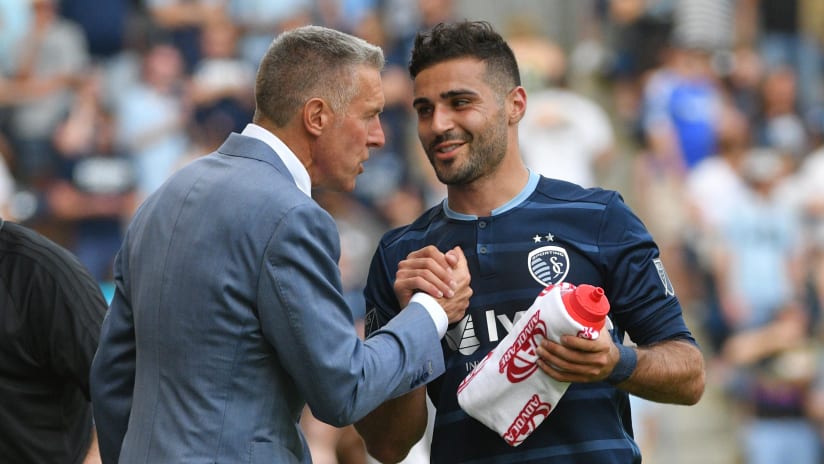KANSAS CITY, Mo. – All Soony Saad wanted was to play a soccer game and come home. He didn’t sign on for any geopolitical drama along the way. But there he was, an American in North Korea, watching that country shake a nuclear fist in the world’s face.
It was the morning of Sept. 3, a Sunday. Saad, who was born in Michigan but plays internationally for Lebanon, was in Pyongyang for an Asian Cup qualifier against the host country on Sept. 5.
“I woke up at 6 a.m. and I heard some chanting – military chanting – in the streets,” the Sporting Kansas City forward told MLSsoccer.com on Wednesday. “I heard the national anthem played on speakers, and I turned on the news and they’re saying that North Korea tested some hydrogen, ballistic – whatever-it-is.
“I’m like, ‘Oh, my God. When’s the game? We just have to hurry up and get out of here.’”
The “whatever-it-is” was a nuclear test, North Korea’s largest. Depending on which analyst you ask, its yield was anywhere from 50 kilotons to hundreds – thermonuclear territory.
Threats and counter-threats from Pyongyang and Washington followed – and just when Saad had gotten used to his situation, after going into the country with more than a little trepidation.
“It was really nerve-wracking beforehand, especially with all the things escalating politically,” he said. I was kind of really nervous about going to North Korea, especially being an American. I know I wouldn’t use my American passport, but you still have that in the back of your mind, that if things were to escalate, then I’d be the first one that’s closest to them. I think while I was there, I was the only American in that country.
“I think the only thing that calmed me down was an English journalist – not with the team, but he came to cover the game and he was touring North Korea. He basically told me that North Koreans take pride in their sports, in their football, and that if anything were to happen to me they would definitely get sanctioned by FIFA. That made me feel a lot safer. I gave my American passport to the team manager just in case.”
But when Saad arrived, he quickly set his fears aside, even though he and his teammates took precautions not to antagonize anyone.
“I think that was more of a mental thing, that someone was watching, or ‘Watch what you say,’ Maybe there were cameras or microphones, but the guys on the team stayed respectful. You know, there’s always banter with the team. There’s jokes. Everyone’s messing around, especially the Lebanese kind of style. It’s a little more jokey than the Americans.
“Our manager told us beforehand to tone it down a bit, and I think we were very respectful, and we received nothing but kindness.”
Saad even got to use a few words of Korean, picked up from his family’s TV-watching habits when he was growing up.
“My father really cultured us,” he said. “We’d watch this South Korean drama. And so I was the only one on the team speaking to the North Koreans – saying ‘Hello’ and ‘See you later’ and ‘Thank you,” and they were really responsive, very nice. And all my teammates were like, ‘How do you know that?’”
Then came the news of the nuclear test, and a return to uncertainty – but all worked out in the end for Lebanon, who grabbed a late 2-2 draw, with Saad on the pitch as an 88th-minute substitute, to stay top of their group.
The atmosphere in the stadium was its own sort of daunting, but not in a bad way, Saad said.
“All the university students wore white with a red tie, and they filled up the majority of the stadium,” he said. “At half-field, in the stands, there were 12, maybe 14 cheerleaders that wore like army uniforms, and they led the chants. Their heads all moved in sync, and everybody had these wooden clapper things, and the ladies in the middle led the chants.
“It was loud. Super loud. I have to give them credit; they had a proper atmosphere.”
Then came the late draw, followed by another two-day wait for a flight out – and despite his overall positive experience, Saad was glad to take it.
“I never thought I’d say the words, ‘I’m so glad to be in China,’” he said.
This isn’t the first time Saad has found himself in unsettling circumstances while on international duty with Les Cedres. In November 2013, just four days after being cap-tied, he was in Beirut when he heard a deadly suicide-bomb attack near the Iranian embassy, not far from his grandmother’s home. (She was unharmed.)
Still, Saad – whose father emigrated from Lebanon in the 1980s to escape that country’s civil war – has no regrets.
“I’ve gotten to become closer to my family, to my culture, to my dad’s side of the family,” he said. “I’ve learned the language a lot better. I’ve opened some doors with my Asian passport.
“My dad always called me ‘the citizen of the world.’ I always laughed at it, but it’s kind of true. It’s really neat, and it’s humbling, to travel to all these places in the world and say that you’ve been there, and hopefully tell these stories to my children and grandchildren one day.”




